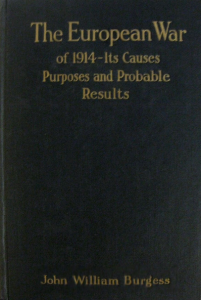JOHN WILLIAM BURGESS
THE EUROPEAN WAR OF 1914
Its Causes, Purposes, and Probable Results
1915

INDEX
p. 203—209

| Back to
main page |
|
| DOWNLOAD Burgess' The European
War |
| CHAPTER |
PAGE |
||
| Preface |
I |
||
| I |
The Occasions of
the War |
1 |
|
| II |
The Proximate
Causes of the War |
45 |
|
| III |
The Underlying
Causes of the War |
82 |
|
| IV |
American
Interests in the Outcome of the War |
113 |
|
| V |
The
Austro-Hungarian Empire and the Crime at Sarajevo |
155 |
|
| VI |
Belgian Neutrality |
167 |
|
| VII |
The Export of
Arms and Munitions to Belligerents |
179 |
|
| VIII |
The German Emperor |
189 |
|
| — |
Index |
203 |
| Back to main page |
|
| Previous chapter |